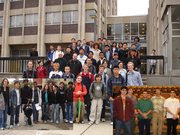06-240/Homework Assignment 4: Difference between revisions
From Drorbn
Jump to navigationJump to search
mNo edit summary |
John.koziar (talk | contribs) m (Added bit about honorificabilitudinitatibus.) |
||
| (5 intermediate revisions by 2 users not shown) | |||
| Line 1: | Line 1: | ||
{{06-240/Navigation}} |
{{06-240/Navigation}} |
||
* Read sections 1.5 through 1.7 in our textbook. Remember that reading math isn't like reading a novel! If you read a novel and miss a few details most likely you'll still understand the novel. But if you miss a few details in a math text, often you'll miss everything that follows. So reading math takes reading and rereading and rerereading and a lot of thought about what you've read. |
* '''Read''' sections 1.5 through 1.7 in our textbook. Remember that reading math isn't like reading a novel! If you read a novel and miss a few details most likely you'll still understand the novel. But if you miss a few details in a math text, often you'll miss everything that follows. So reading math takes reading and rereading and rerereading and a lot of thought about what you've read. |
||
* Solve problems |
* '''Solve''' problems 3, 8, 9, 10 and 11 on pages 41-42, but submit only your solutions of problems 8 and 9. |
||
* Solve problems |
* '''Solve''' problems 1, 2, 4, 5, 9 and 16 on page 53-56, but submit only your solutions of problems 4, 5 and 9. |
||
{| |
{| |
||
| Line 11: | Line 11: | ||
|'''Just for Fun.''' |
|'''Just for Fun.''' |
||
* Take a large integer and write it in base 10. Cut away the "singles" digit, double it and subtract the result from the remaining digits. Repeat the process until the number you have left is small. Prove that the number you started from is divisible by 7 iff the resulting number is divisible by 7. Thus the example on the right shows that 86415 is divisible by 7 as 0 is divisible by 7. (I learned this trick a few days ago from [http://www.math.toronto.edu/hovinen/ Bradford Hovinen]). |
* Take a large integer and write it in base 10. Cut away the "singles" digit, double it and subtract the result from the remaining digits. Repeat the process until the number you have left is small. Prove that the number you started from is divisible by 7 iff the resulting number is divisible by 7. Thus the example on the right shows that 86415 is divisible by 7 as 0 is divisible by 7. (I learned this trick a few days ago from [http://www.math.toronto.edu/hovinen/ Bradford Hovinen]). |
||
* Find a similar criterion for divisibility by 17 and for all other divisibilities. |
* Find a similar criterion for divisibility by 17 and for all other divisibilities and indivisibilities. |
||
* Note that the word " |
* Note that the word "indivisibilities" has the largest number of repetitions of a single letter among all words in the English language (7 i's). I've known this fact for years but this is the first time that I'm finding a semi-legitimate use for that word! (It is tied with the word honorificabilitudinitatibus for seven 'i's. You can read more about it here: http://en.wikipedia.org/wiki/Honorificabilitudinitatibus) |
||
| |
| |
||
8641<s>5</s> |
8641<s>5</s> |
||
Latest revision as of 16:11, 5 October 2006
| ||||||||||||||||||||||||||||||||||||||||||||||||||||||
- Read sections 1.5 through 1.7 in our textbook. Remember that reading math isn't like reading a novel! If you read a novel and miss a few details most likely you'll still understand the novel. But if you miss a few details in a math text, often you'll miss everything that follows. So reading math takes reading and rereading and rerereading and a lot of thought about what you've read.
- Solve problems 3, 8, 9, 10 and 11 on pages 41-42, but submit only your solutions of problems 8 and 9.
- Solve problems 1, 2, 4, 5, 9 and 16 on page 53-56, but submit only your solutions of problems 4, 5 and 9.
Just for Fun.
|
8641 |
